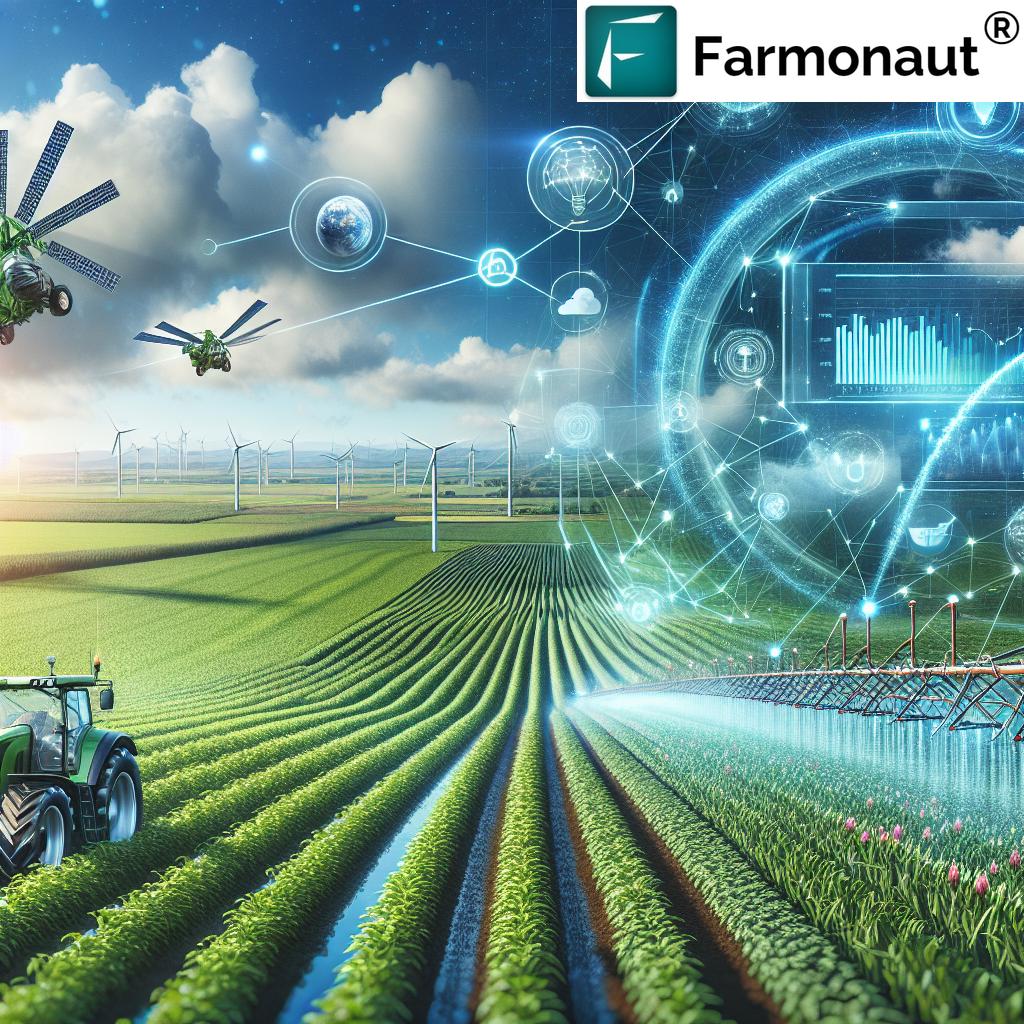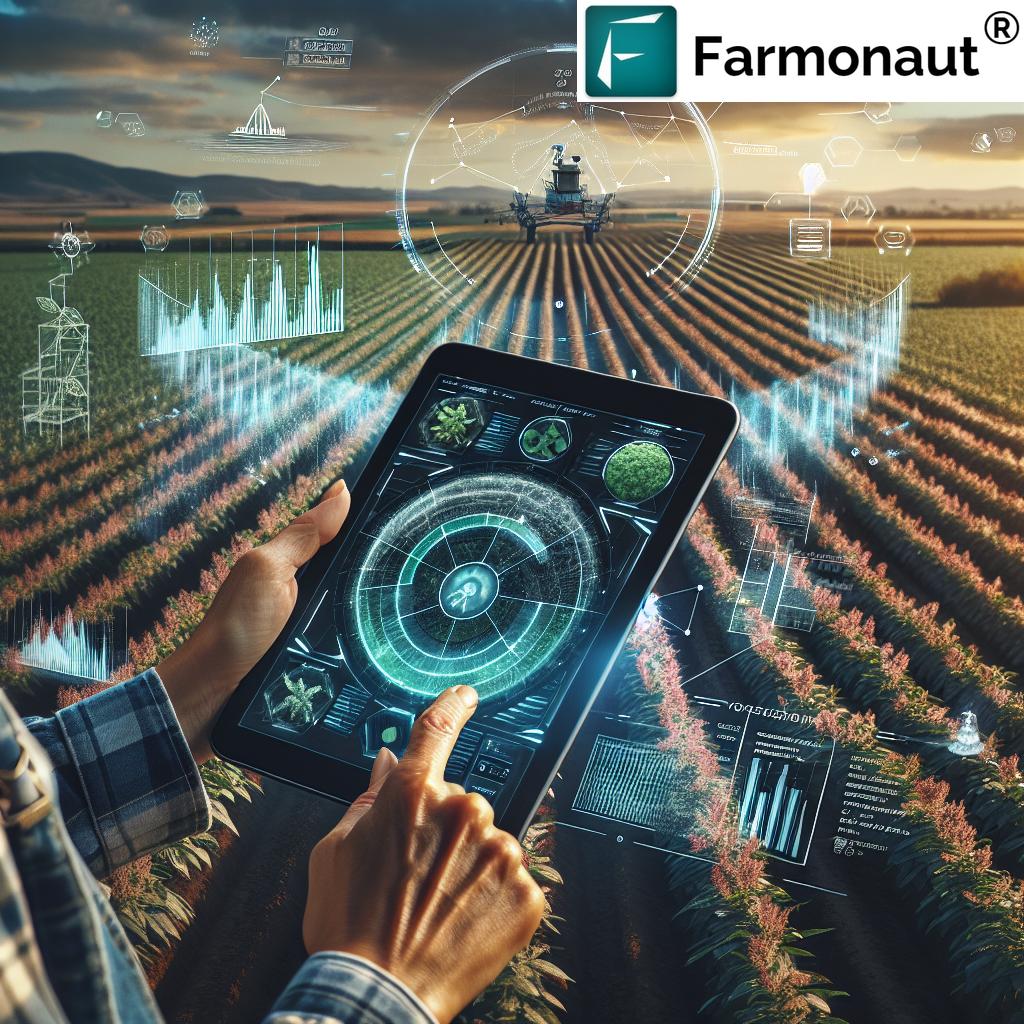Revolutionizing Agriculture: How Precision Farming and Remote Sensing Boost Crop Yields and Sustainability
“Precision agriculture technology can increase crop yields by up to 30% while reducing water usage by 20-50%.”
In the ever-evolving landscape of modern agriculture, we’re witnessing a remarkable transformation. The fusion of precision farming techniques and remote sensing technologies is reshaping the way we cultivate crops, manage resources, and ensure food security for a growing global population. As we delve into this agricultural revolution, we’ll explore how innovative solutions like those offered by Farmonaut are at the forefront of this change, empowering farmers with data-driven insights and cutting-edge tools.
The Dawn of Precision Agriculture
Precision agriculture technology has emerged as a game-changer in the farming industry. By leveraging advanced tools and data analytics, farmers can now make informed decisions that optimize every aspect of their operations. This approach not only enhances productivity but also promotes sustainability by minimizing resource wastage.
- Improved crop yields through targeted interventions
- Efficient use of water, fertilizers, and pesticides
- Reduced environmental impact of farming practices
At the heart of this revolution is the integration of remote sensing in farming. Satellite imagery for agriculture has opened up new possibilities for monitoring vast areas of farmland with unprecedented accuracy and frequency. This technology allows farmers to detect issues early, track crop health, and make timely interventions.

Farmonaut: Pioneering Smart Farming Solutions
In this landscape of agricultural innovation, Farmonaut stands out as a pioneering force. Their advanced crop monitoring systems and smart irrigation solutions are transforming the way farmers approach their daily operations. By harnessing the power of satellite technology and artificial intelligence, Farmonaut provides farmers with real-time insights into their fields’ conditions.
Key features of Farmonaut’s platform include:
- Satellite-based crop health monitoring
- AI-driven advisory systems for personalized farming strategies
- Blockchain-based traceability for supply chain transparency
- Resource management tools for optimizing farm operations
These innovative solutions are accessible through various platforms:
The Power of Remote Sensing in Agriculture
Remote sensing has revolutionized the way we monitor and manage agricultural lands. By utilizing satellite imagery, drones, and other airborne sensors, farmers can now access a wealth of information about their crops without setting foot in the field.
- Early detection of crop stress and diseases
- Accurate estimation of crop yields
- Monitoring of soil moisture and nutrient levels
- Identification of pest infestations
“Satellite imagery in agriculture can detect crop stress up to 2 weeks earlier than visual inspection, improving response time.”
This early detection capability is crucial for implementing timely interventions, potentially saving entire harvests from failure. Farmonaut’s advanced algorithms process this satellite data to provide actionable insights, enabling farmers to make data-driven decisions with confidence.
Transforming Farm Management with Data Analytics
The integration of agricultural data analytics into farm management software has ushered in a new era of efficiency and precision. These sophisticated systems process vast amounts of data from various sources, including satellite imagery, weather stations, and IoT sensors, to provide comprehensive insights into farm operations.
- Predictive analytics for optimal planting and harvesting times
- Resource allocation optimization based on real-time data
- Yield prediction models for better crop planning
- Risk assessment tools for crop insurance and financial planning
Farmonaut’s farm management software exemplifies this data-driven approach, offering farmers a user-friendly interface to access complex analytics and make informed decisions. The platform’s AI-powered advisory system, Jeevn AI, provides personalized recommendations tailored to each farm’s unique conditions.
For developers looking to integrate these powerful tools into their own applications, Farmonaut offers an API solution. Explore the possibilities at Farmonaut API and dive into the developer documentation at API Developer Docs.
Sustainable Farming Practices Through Technology
As the global community becomes increasingly aware of the environmental impact of agriculture, sustainable farming practices have taken center stage. Precision agriculture technology plays a crucial role in promoting sustainability by enabling farmers to do more with less.
- Reduced use of water through smart irrigation systems
- Targeted application of fertilizers and pesticides
- Minimized soil erosion through better land management
- Lower carbon footprint through optimized machinery use
Farmonaut’s platform contributes to these sustainability goals by providing tools for efficient resource management and carbon footprint tracking. This allows farmers to not only reduce their environmental impact but also potentially access new markets and premium prices for sustainably produced crops.

Enhancing Crop Health with Advanced Monitoring
One of the most significant advantages of precision agriculture is the ability to monitor crop health with unprecedented detail. Advanced sensors and imaging technologies can detect subtle changes in plant physiology that are invisible to the naked eye.
- Multispectral and hyperspectral imaging for detailed crop analysis
- NDVI (Normalized Difference Vegetation Index) for assessing plant vigor
- Thermal imaging for detecting water stress
- Machine learning algorithms for identifying patterns and anomalies
Farmonaut’s crop monitoring systems leverage these technologies to provide farmers with a comprehensive view of their fields’ health. By detecting issues early, farmers can implement targeted interventions, potentially saving crops from disease or pest damage before they become visible to the naked eye.
Optimizing Irrigation with Smart Solutions
Water scarcity is a growing concern in many agricultural regions, making efficient irrigation a top priority. Smart irrigation solutions, powered by remote sensing and IoT technologies, are revolutionizing water management in agriculture.
- Soil moisture sensors for real-time monitoring
- Weather data integration for precise irrigation scheduling
- Automated irrigation systems responsive to plant needs
- Drip irrigation optimization for water conservation
Farmonaut’s platform integrates these smart irrigation solutions, allowing farmers to optimize their water usage based on real-time data and predictive analytics. This not only conserves water but also improves crop yields by ensuring plants receive the right amount of water at the right time.
Precision Agriculture vs. Traditional Farming: A Comparison
To understand the full impact of precision agriculture, it’s helpful to compare it with traditional farming methods. The following table illustrates the key differences and potential improvements:
| Agricultural Aspect | Traditional Farming Method | Precision Farming Method | Estimated Improvement (%) |
|---|---|---|---|
| Crop Yield | Uniform application of inputs | Targeted application based on field variability | 10-30% |
| Water Usage Efficiency | Scheduled irrigation | Smart irrigation based on real-time data | 20-50% |
| Fertilizer Application | Blanket application | Variable rate application | 15-40% |
| Pest Management | Reactive, whole-field treatment | Proactive, targeted treatment | 25-60% |
| Resource Allocation | Based on historical practices | Data-driven decision making | 20-35% |
| Overall Farm Productivity | Limited by traditional constraints | Optimized through technology | 15-30% |
As the table demonstrates, precision farming methods offer significant improvements across various aspects of agriculture. These advancements not only boost productivity but also contribute to more sustainable and resource-efficient farming practices.
The Role of GIS in Modern Agriculture
Geographic Information Systems (GIS) have become an integral part of precision agriculture, allowing farmers to visualize and analyze spatial data related to their fields. GIS applications in agriculture include:
- Field mapping and boundary delineation
- Soil composition analysis and mapping
- Crop rotation planning and record-keeping
- Yield mapping for performance analysis
Farmonaut’s platform incorporates GIS technology to provide farmers with detailed maps and spatial analytics of their fields. This allows for precise planning and execution of farming activities, taking into account the unique characteristics of each plot of land.
Enhancing Pest and Disease Management
Pest and disease management is a critical aspect of farming that has been significantly improved by precision agriculture technologies. Remote sensing and data analytics enable early detection and targeted treatment of issues, reducing the need for broad-spectrum pesticide applications.
- Spectral imaging for identifying pest-infested areas
- Predictive models for disease outbreak forecasting
- Precision spraying technologies for targeted treatment
- Biological control integration through data-driven decision making
Farmonaut’s pest and disease detection capabilities help farmers identify potential threats before they become widespread, allowing for timely and localized interventions. This not only reduces crop losses but also minimizes the environmental impact of pest control measures.
The Future of Farming: AI and Machine Learning
As we look to the future of agriculture, artificial intelligence (AI) and machine learning are set to play an increasingly important role. These technologies are already being integrated into various aspects of precision farming, including:
- Automated crop classification and health assessment
- Predictive maintenance for farm equipment
- Robotic harvesting and weed control
- Advanced yield prediction models
Farmonaut’s commitment to innovation is evident in their ongoing development of AI-powered tools. The Jeevn AI advisory system is just one example of how machine learning can provide personalized, data-driven recommendations to farmers, helping them make complex decisions with greater confidence.
Blockchain Technology in Agriculture
Blockchain technology is emerging as a powerful tool for enhancing transparency and traceability in agricultural supply chains. Its applications in agriculture include:
- Secure and transparent record-keeping of farm operations
- Traceability of products from farm to consumer
- Smart contracts for agricultural transactions
- Improved food safety through enhanced traceability
Farmonaut’s blockchain-based traceability solutions offer a robust system for tracking agricultural products throughout the supply chain. This not only builds consumer trust but also helps farmers access premium markets that demand transparency and sustainability.
The Economic Impact of Precision Agriculture
The adoption of precision agriculture technologies has significant economic implications for farmers and the agricultural sector as a whole. Some key economic benefits include:
- Increased profitability through improved yields and reduced input costs
- Access to new markets and premium prices for sustainably produced crops
- Reduced financial risks through better crop management and insurance tools
- Improved resource allocation and investment planning
Farmonaut’s platform contributes to these economic benefits by providing farmers with the tools and insights needed to optimize their operations and make informed financial decisions. The company’s subscription-based model and flexible pricing tiers make these advanced technologies accessible to farms of all sizes.
Challenges and Considerations in Adopting Precision Agriculture
While the benefits of precision agriculture are clear, there are challenges that farmers and the industry must address for widespread adoption:
- Initial investment costs for technology and equipment
- Training and education for farmers and agricultural workers
- Data privacy and security concerns
- Integration with existing farm management practices
Farmonaut addresses many of these challenges by offering a user-friendly platform that integrates seamlessly with existing farm operations. Their focus on affordable solutions and comprehensive support helps lower the barriers to entry for farmers looking to adopt precision agriculture technologies.
Conclusion: Embracing the Agricultural Revolution
As we’ve explored throughout this article, precision farming and remote sensing technologies are revolutionizing agriculture in profound ways. From boosting crop yields to enhancing sustainability, these innovations are reshaping the future of farming. Companies like Farmonaut are at the forefront of this revolution, providing farmers with the tools and insights they need to thrive in an increasingly complex and challenging agricultural landscape.
By embracing these technologies, farmers can not only improve their productivity and profitability but also contribute to more sustainable and resilient food systems. As we look to the future, it’s clear that precision agriculture will play a crucial role in meeting the global challenges of food security and environmental stewardship.
We encourage farmers, agribusinesses, and agricultural professionals to explore the possibilities offered by precision agriculture technologies. Whether you’re looking to optimize your current operations or completely transform your approach to farming, platforms like Farmonaut offer the tools and support needed to succeed in this new era of agriculture.
Frequently Asked Questions (FAQ)
- What is precision agriculture?
Precision agriculture is an approach to farm management that uses information technology and data analysis to optimize crop yields and reduce resource waste. - How does remote sensing benefit farmers?
Remote sensing allows farmers to monitor large areas of land efficiently, detect crop stress early, and make informed decisions about irrigation, fertilization, and pest control. - What types of data does Farmonaut’s platform use?
Farmonaut utilizes satellite imagery, weather data, soil information, and historical crop data to provide comprehensive insights to farmers. - Is precision agriculture only for large farms?
No, precision agriculture technologies can benefit farms of all sizes. Farmonaut offers scalable solutions suitable for small, medium, and large agricultural operations. - How does blockchain technology improve agriculture?
Blockchain enhances transparency and traceability in agricultural supply chains, improving food safety and building consumer trust. - What is the role of AI in precision farming?
AI helps analyze complex agricultural data, providing personalized recommendations and automating decision-making processes for more efficient farm management. - How can farmers get started with precision agriculture?
Farmers can begin by exploring platforms like Farmonaut, which offer user-friendly interfaces and support for implementing precision agriculture technologies.






